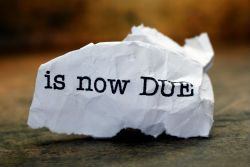
Unfortunately, there is a great deal of misleading information out there about how to deal with overwhelming debt. Some debt management companies encourage clients to stop making payments when they consolidate debts, but this can actually lead to bigger problems in the future.
If you’re using debt management to avoid bankruptcy, not paying debts can actually lead you to bankruptcy within a few months anyway.
But what if your mind is already made up to file for bankruptcy? If a debt is going to be discharged in a few weeks or months, should you bother paying it?
The answer is maybe, but it depends on the type of debt and chapter bankruptcy you choose.
Chapter 7 and Chapter 13 Bankruptcy
First, let’s consider the two different chapters of bankruptcy.
Chapter 7 bankruptcy discharges all or most unsecured debts. It’s usually the best option for individuals facing financial challenges who are earning at or below the median income, or for those who have very little disposable income each month.
People who have few or no assets often choose this type of bankruptcy because they have nothing to lose. Any assets they do happen to own are liquidated unless exempted and that money is used to pay the creditors.
Any debts not paid off in the liquidation of assets are discharged and the debtor bears no legal responsibility for the debt.
Chapter 13, on the other hand, is a reorganization of debt. It provides the debtor with more time (usually three to five years) to pay their debts. At the end of the timeframe, any unsecured debt not paid in discharged.
This type of bankruptcy is a better option for those who have a decent wage and assets they want to protect. Chapter 13 filers must pay their secured debts on assets they intend to keep, such as their home or vehicle.
To learn more about secured debts and Chapter 13 bankruptcy, check out this information.
To Pay or Not to Pay?
Many attorneys recommend stopping payment on your debts if you are making any, when you decide to file. Bankruptcy creates expenses and the money you’ve been using to pay the debts can be put toward your filing fees. As a matter of fact, this is one of the primary reasons attorneys tell people to stop making payments – they lack the money to file for bankruptcy, but they can put the payments toward their fees.
And since the debts are likely to be discharged when you file for Chapter 7 bankruptcy, you’re paying money toward a debt that’s going to be eliminated anyway. You’re essentially throwing money away by paying unsecured debts once you’ve made the decision to file.
Every situation is different, so whether or not and when you stop paying your debts can vary. Some people just aren’t comfortable not making payments when they have the money to do so – even if they’ve been struggling and have fallen behind over the months and years on a particular debt.
Your best bet is to speak with an experienced bankruptcy attorney who can review your situation and give you advice specific to your case.
For more information or to schedule a consultation to discuss your bankruptcy strategy, contact the Law Office of Robert M. Geller at 813.254.5696 to schedule a consultation.



























![Signs That You May Need to File Bankruptcy [Infographic]](https://djml3wkzi26ea.cloudfront.net/wp-content/uploads/2021/01/signs-chap7-v-chap13.jpg)
![How To File for Bankruptcy [Infographic]](https://djml3wkzi26ea.cloudfront.net/wp-content/uploads/2020/07/bankruptcy-steps-infographic-web.jpg)










